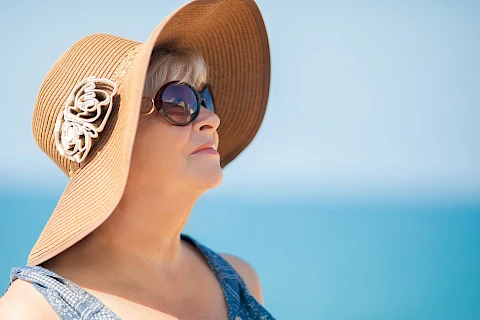
Summer is great for enjoying the outdoors, but you should also protect your eyes from the sun. As we age, our eyes become more susceptible to damage from ultraviolet (UV) rays. Both seniors and their caregivers may want to take advantage of protective measures that can help shield the eyes from the sun.
The Importance of UV Protection
UV rays are radiation from the sun that can harm your eyes. Prolonged exposure to UV rays can lead to a range of eye problems, including cataracts, macular degeneration, and even cancer of the eye. People who spend much time in the sun without eye protection are prone to develop these conditions. This is especially relevant for seniors, whose eyes are already more vulnerable due to age-related changes. Taking steps to protect your eyes can help maintain your vision and overall health.
Choosing the Right Sunglasses
Protecting your eyes from the sun starts with choosing the right sunglasses. Not all sunglasses are created equal, so it's important to select a pair that offers 100% UV protection. This means that the sunglasses block both UVA and UVB rays, which are the most harmful types of ultraviolet radiation. Wraparound styles are also a good choice because they cover more of your face and prevent sunlight from entering from the sides. When shopping for sunglasses, look for labels that specify "100% UV protection" to ensure you're getting the maximum benefit. For seniors, a good pair of sunglasses can not only protect your eyes but also enhance your comfort and vision on sunny days.
The Role of Wide-Brimmed Hats
While sunglasses are crucial, they aren't the only tool in your sun-protection arsenal. Wide-brimmed hats offer an additional layer of protection by shielding your eyes and face from direct sunlight. A hat with a brim that extends at least 3 inches all around is ideal for providing ample shade. Styles like bucket hats or sun hats are particularly effective. Combining a wide-brimmed hat with your sunglasses gives optimal protection and reduces glare, making it easier to see on bright summer days.
Seeking Shade During Peak Sunlight Hours
The sun's rays are strongest between 10 AM and 4 PM, making these the peak sunlight hours when you're most at risk. During these times, it's best to stay in the shade as much as possible. This doesn't mean you have to stay indoors; instead, seek out shaded areas like trees, umbrellas, or canopies when you're outdoors. If you're planning a day out, arrange your activities to avoid prolonged exposure during the peak hours. This can significantly reduce your risk of eye damage and make your time outside more enjoyable.
Risks of Prolonged Sun Exposure
Prolonged exposure to the sun is dangerous for seniors because it can accelerate the development of cataracts, a condition where the lens of the eye becomes cloudy, impairing vision. Cataracts are already common among older adults, and UV exposure can make them worse. Other potential eye problems from too much sun include macular degeneration, which affects the central part of the retina and can lead to vision loss. Regular eye check-ups are essential to catch these issues early. Your eye doctor can provide personalized advice on how to protect your vision based on your specific needs.
Additional Care for Seniors at Home
Protecting your eyes from the summer sun is crucial, especially for seniors. You can protect your eyes from damage by wearing UV-blocking sunglasses, and wide-brimmed hats, and staying in the shade during peak sunlight hours. Remember, the harmful effects of sun exposure can accumulate over time, so it's never too late to start taking precautions. Take these steps now to enjoy a summer with activities while keeping your eyes safe.
For personalized senior care services in Fresno, Clovis, Hanford, Visalia, and Tulare, contact Senior Helpers Fresno. We are here to support you in maintaining a healthy and active lifestyle, including help with basic eye care.